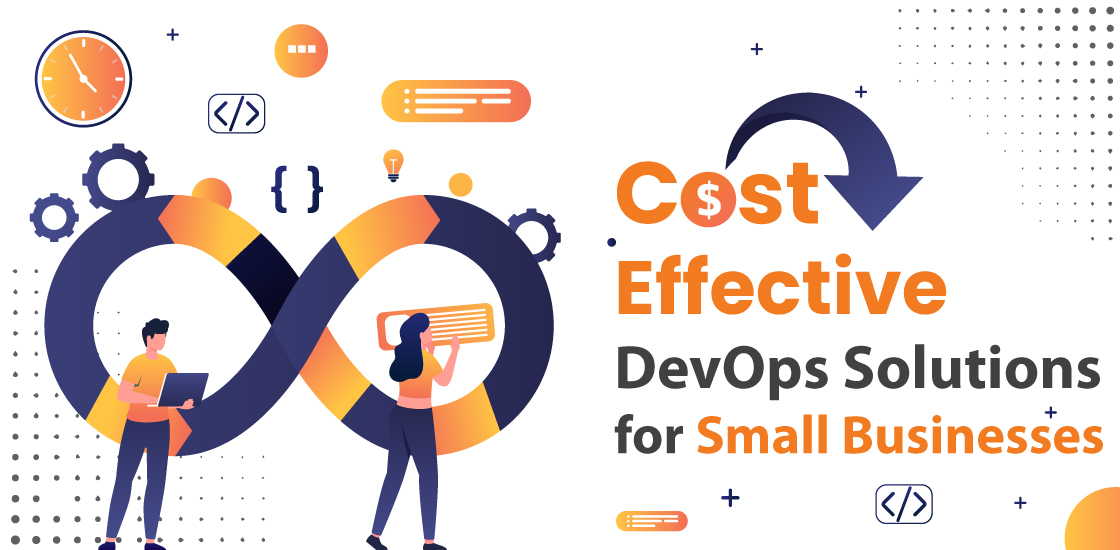Cost-Effective DevOps Solutions for Small Businesses
What is DevOps?
DevOps is a set of practices that emphasizes collaboration, communication, automation, and monitoring throughout the software development and delivery process.
Small businesses may face challenges in implementing DevOps due to limited resources, expertise, and budget. However, there are cost-effective DevOps solutions that can help small businesses achieve their development and delivery goals while optimizing their resources and budget.
Some of the cost-effective DevOps solutions for small businesses include using open-source tools, leveraging cloud services, adopting agile methodologies, automating testing and deployment processes, and implementing continuous integration and delivery (CI/CD) pipelines.
By implementing cost-effective DevOps solutions, small businesses can improve their software development and delivery speed, quality, and efficiency, while reducing costs and minimizing risks. This can help small businesses stay competitive and achieve their business objectives on top of Form.
DevOps is a software development and delivery process that places a strong emphasis on cooperation and communication between development and operations teams. With the use of this strategy, businesses may produce higher-quality, more dependable, and quicker software. Due to their limited resources and financial constraints, small organizations, however, have difficulties when implementing DevOps.
However, did you realize that DevOps also helps you cut expenses which can really help small businesses?
Automation is the answer to everything. The main line is that DevOps helps you save money, whether that means you need a smaller crew to manage your infrastructure or you dynamically scale it up and down dependent on the volume of traffic you receive.
In this blog, we’ll highlight a few ways DevOps helps you save money.
Some of the proven methods for reducing costs are as follows:
1. Cloud-based Infrastructure
Moving your infrastructure to the cloud not only eliminates development and maintenance costs (granted, there is a monthly fee, but that is still considerably less than the costs of building and maintaining your own infrastructure), but it also reduces the time for your team to concentrate on efficient automation strategies that further optimize your spending.

2. Planning
Every application has different needs and calls for different infrastructure. Experience has taught us that businesses’ lack of knowledge can result in long-term cost increases when they decide to move their infrastructure to the cloud or switch from one cloud provider to another. This is because they incorrectly assess their project and either forget to purchase services or resources or wind up purchasing more than they require.
3. Make the most of your resources
Understanding your requirement of what resources are needed for your infrastructure is the most crucial aspect of your infrastructure. Overprovisioning resources may cost you more and is not needed an extra burden for you. Automated scaling and load balancing can really help you to manage your resource usage and you pay only what you use without any performance issues.
4. Reduce your dependency on people
Organizations can release software more quickly and with fewer resources thanks to DevOps and automation, which also drastically lowers release expenses. Testing is one task where automation is especially useful. The majority of testing-related tasks can be automated, although we don’t advise doing so. By using fewer testers, you can lower human costs while giving your team more time to work on activities that are more crucial.
5. Using Serverless computing
Most likely, the best of DevOps is serverless computing. Due to the fact that you just have to pay for the resources your app uses, this technology enables your business to drastically reduce costs. Because no resources are allocated when your software is not in use, there is nothing to pay for. The utility bills operate similarly.
AWS is the industry leader in serverless computing, but Google and Microsoft also provide these services.
6. Adhere to DevSecOps principles.
Although many organizations have security procedures in place, few actually follow them, which leaves security gaps. Breaches are incredibly expensive in many ways, from the expense of determining what was compromised to the cost of safeguarding your infrastructure to the cost of compensating your consumers.
By putting DevSecOps techniques into practice, security breaches are avoided, along with the costs that come with them.
In conclusion, implementing DevOps practices can help small businesses streamline their software development processes and achieve faster time-to-market, better quality products, and improved customer satisfaction. However, for small businesses with limited resources, it can be challenging to adopt DevOps without breaking the bank.
To overcome this challenge, small businesses can adopt cost-effective DevOps solutions such as cloud-based services, open-source tools, and automation frameworks that require minimal setup and maintenance. They can also leverage DevOps consulting services and collaborate with DevOps professionals to customize their DevOps processes to meet their specific needs.
Overall, DevOps is a critical enabler for small businesses to remain competitive in a rapidly evolving digital landscape. By adopting cost-effective DevOps solutions, small businesses can optimize their software development processes, increase productivity, and drive business growth while keeping costs low.
 Ashish Christian
20 Feb 2023
Ashish Christian
20 Feb 2023
 US +1 (630) 296 6606
US +1 (630) 296 6606
 India +91 (79) 48904529
India +91 (79) 48904529
 Poland +48 (730) 059 665
Poland +48 (730) 059 665
 reach@techforceglobal.com
reach@techforceglobal.com

 Calendly
Calendly
 LinkedIn
LinkedIn
 Whatsapp
Whatsapp
 Fintech
Fintech
 Education
Education
 Ecommerce
Ecommerce
 Healthcare
Healthcare
 Travel & Hospitality
Travel & Hospitality
 Public Sector
Public Sector




